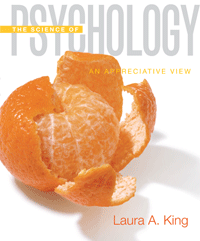| activation-synthesis theory | Theory stating that dreaming occurs when the cerebral cortex synthesizes neural signals generated from activity in the lower part of the brain.
|
 |
 |
 |
| addiction | Either a physical or a psychological dependence, or both, on a drug.
|
 |
 |
 |
| alcoholism | A disorder that involves long-term, repeated, uncontrolled, compulsive, and excessive use of alcoholic beverages and that impairs the drinker's health and social relationships.
|
 |
 |
 |
| automatic processes | States of consciousness that require little attention and do not interfere with other ongoing activities.
|
 |
 |
 |
| barbiturates | Depressant drugs that decrease the activity of the central nervous system.
|
 |
 |
 |
| biological rhythms | Periodic physiological fluctuations in the body.
|
 |
 |
 |
| circadian rhythm | A daily behavioral or physiological cycle, such as the sleep/wake cycle.
|
 |
 |
 |
| cognitive theory of dreaming | Theory proposing that dreaming can be understood by applying the same cognitive concepts that are used in studying the waking mind.
|
 |
 |
 |
| consciousness | Awareness of external events and internal sensations, including awareness of the self and thoughts about one's experiences; this awareness occurs under a condition of arousal.
|
 |
 |
 |
| controlled processes | The most alert states of consciousness.
|
 |
 |
 |
| depressants | Psychoactive drugs that slow down mental and physical activity.
|
 |
 |
 |
| Hallucinogens | Psychoactive drugs that modify a person's perceptual experiences and produce visual images that are not real.
|
 |
 |
 |
| hypnosis | An altered state of consciousness or simply a psychological state of altered attention and expectation, in which the individual is unusually receptive to suggestions.
|
 |
 |
 |
| opiates | Opium and its derivatives; they depress the central nervous system's activity.
|
 |
 |
 |
| physical dependence | The physiological need for a drug, accompanied by unpleasant withdrawal symptoms, such as pain and craving, when the drug is discontinued.
|
 |
 |
 |
| psychoactive drugs | Substances that act on the nervous system to alter consciousness, modify perceptions, and change moods.
|
 |
 |
 |
| psychological dependence | The strong desire to repeat the use of a drug for emotional reasons, such as a feeling of well-being and stress reduction.
|
 |
 |
 |
| REM sleep | Rapid eye movement sleep; stage 5 of sleep, in which dreaming occurs.
|
 |
 |
 |
| social cognitive behavior view of hypnosis | Perspective that views hypnosis as a normal state in which the hypnotized person behaves the way he or she believes a hypnotized person should behave.
|
 |
 |
 |
| stimulants | Psychoactive drugs that increase the central nervous system's activity.
|
 |
 |
 |
| stream of consciousness | James's concept that the mind is a continuous flow of changing sensations, images, thoughts, and feelings.
|
 |
 |
 |
| suprachiasmatic nucleus (SCN) | A small structure in the brain that synchronizes its own rhythm with the daily cycle of light and dark based on input from the retina.
|
 |
 |
 |
| tolerance | The need to take increasing amounts of a drug to produce the same effect.
|
 |
 |
 |
| tranquilizers | Depressant drugs that reduce anxiety and induce relaxation.
|
 |
 |
 |
| unconscious thought | Freud's concept of a reservoir of unacceptable wishes, feelings, and thoughts that are beyond conscious awareness.
|





